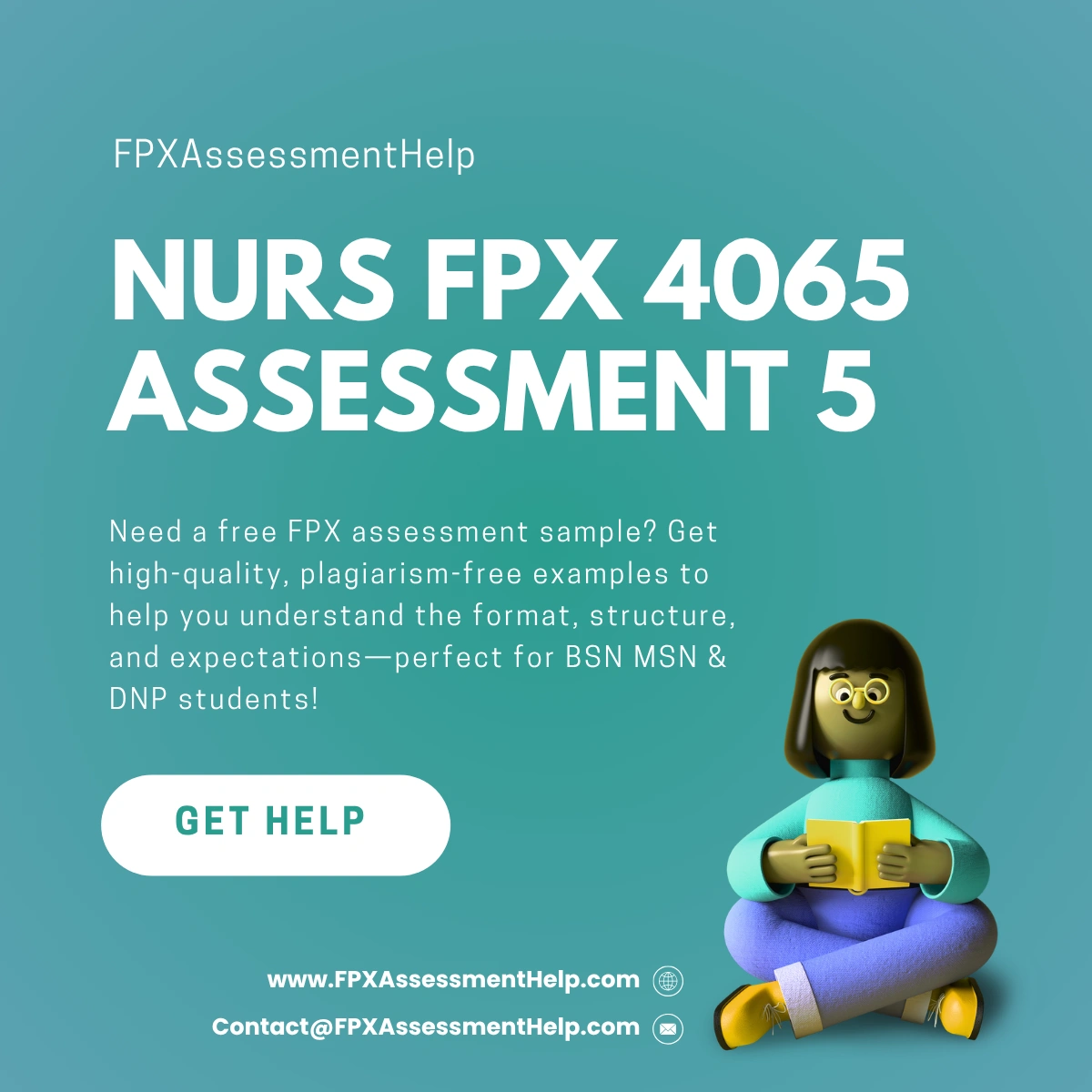NURS FPX 4065 Assessment 5 Final Care Coordination Strategy
Student Name
Capella University
NURS-FPX4065 Patient-Centered Care Coordination
Prof. Name
Date
Final Care Coordination Strategy
Care coordination is a vital process that ensures seamless, continuous care across the health system, especially for individuals with complex conditions. It plays a critical role in improving health outcomes, reducing disparities, and enhancing patient satisfaction (Garfin et al., 2022). This paper focuses on developing a final care coordination strategy for adults with mental illness in Florida, a population facing significant behavioral and physical health challenges. It will explore patient-centered interventions, community resources, policy implications, ethical considerations, and alignment with Healthy People 2030 goals.
Patient-Centered Health Interventions and Timelines
Mental illness in adults is a pressing health concern in Florida, affecting nearly 2.9 million individuals. Many face significant challenges related to physical comorbidities, cultural stigma, and emotional instability (Garfin et al., 2022). These issues require well-rounded, evidence-based, patient-centered care strategies that utilize local community resources and are sensitive to individual needs. The following outlines three key interventions addressing physical, cultural, and psychosocial barriers to effective mental health management, each supported by community partners and measurable timelines.
Comorbid Physical Illnesses
Comorbid conditions such as cardiovascular disease and diabetes are common in adults with serious mental illness (SMI) and reduce their lifespan by 15-20 years (Nielsen et al., 2021). The patient-centered approach ought to require periodic physical health check-ups, such as BMI, blood pressure, glucose levels, lipid profiles, and smoking status, as part of mental health therapy. Community resources play a crucial role in supporting coordinated mental health care. Care Resource offers both physical and behavioral health services on a sliding fee scale, making care accessible for uninsured and underinsured individuals (Care Resource, 2025).
Caron Florida integrates routine physical health screenings into their mental health therapy programs to ensure comprehensive care (Caron Florida, 2024). The Mental Health Association of Central Florida (MHACF) supports coordination through its Mental Health Connections program, which links patients with appropriate physical health care providers (MHACF, 2025). The intervention is to start at the intake, followed by screenings after three months, and lifestyle counseling to be started in the first month and continued during the treatment period.
Cultural Stigma and Mental Health Literacy
Mental illness stigma, particularly in a culturally diverse community, tends to cause late treatment and poor outcomes. A large number of patients can be opposed to receiving care because of the shame or fear of judgment (Ahad et al., 2023). As a response, culturally specific mental health education activities should be provided on a biweekly basis, with linguistically and culturally sensitive resources such as booklets and face-to-face presentations. Such sessions will make patients aware of their condition, decrease stigma, and motivate them to take part in the treatment. NAMI Florida is a key community partner that provides culturally relevant public education to raise awareness about mental health issues (NAMI Florida, 2025).
The Mental Health Association of Central Florida (MHACF) conducts community outreach sessions to engage and educate the public on mental health resources and support (MHACF, 2025). Care Resource also contributes by offering educational programs focused on mental health awareness and treatment options, particularly among minority populations (Care Resource, 2025). The learning process must begin two weeks after the diagnosis and proceed every two weeks over a period of six months, with post- and pre-session surveys to assess the increase in knowledge and decrease in stigma.
Emotional Dysregulation
Emotional dysregulation, such as recurring depressive or anxious episodes, is common among adults with mental illness. A patient-centered intervention involves offering weekly Mindfulness-Based Cognitive Therapy (MBCT), a proven approach that combines cognitive therapy with mindfulness practices to help individuals manage their emotions and prevent relapse (Gkintoni et al., 2025). This therapy enhances emotional resilience and improves quality of life. Caron Florida supports this approach by offering Mindfulness-Based Cognitive Therapy (MBCT) as part of its psychological treatment programs (Caron Florida, 2024).
The Outlook Clinic, operated by the Mental Health Association of Central Florida (MHACF), provides access to free MBCT sessions for individuals in need (MHACF, 2025). NAMI Florida collaborates with mental health professionals to deliver mindfulness programs that promote emotional regulation and mental well-being (NAMI Florida, 2025). These sessions should begin within the first month of diagnosis and continue weekly for six months, aiming for a 40% improvement in PHQ-9 depression scores.
Ethical Decisions in Designing Patient-Centered Health Interventions
Patient-centered intervention designs in adults with mental illness are characterized by a number of intricate ethical issues that should be balanced between individual autonomy, cultural sensitivity, and equal access to care. Respecting the autonomy of the patient despite the fact that they might be experiencing mental health issues, which can affect their judgment or decision-making capacity, is one of the major ethical considerations. Specifically, in the case of using MBCT or lifestyle change, care coordinators should make sure that patients are well-informed and able to consent to the treatment despite possible cognitive or emotional impairments (Nagaoka et al., 2023). This raises the ethical question: How do we ensure truly informed consent in individuals who may struggle with comprehension due to their mental state?
The other ethical issue is that of cultural stigma and the possibility of promoting shame through the introduction of educational programs unintentionally. Although culturally sensitive education is meant to decrease stigma, it may be perceived by the patients as patronizing and intrusive unless implemented in a sensitive manner. The question then arises: How do we make interventions culturally competent and respectful in a way that does not make patients feel labeled or marginalized? As Ahad et al. (2023) note, these concerns can be alleviated by getting to know the beliefs of patients and engaging them in care planning, thus empowering individuals.
NURS FPX 4065 Assessment 5 Final Care Coordination Strategy
Finally, we have the problem of equal access to physical health screening and therapy services. The ethical principle of justice is considered to be central to the intervention design because many adults with mental illnesses are either uninsured or experience socioeconomic limitations. Such community programs as Care Resource and MHACF can fill this gap because they provide their services on a sliding scale or, in some cases, free of charge, which makes interventions available to vulnerable populations (Care Resource, 2025; MHACF, 2025).
Relevant Health Policy Implications
Supportive health policies that increase access, integration, and continuity of services are essential to effective care coordination of adults with mental illness. The Mental Health Parity and Addiction Equity Act (MHPAEA) is one of the main policies; it requires that mental health insurance coverage be similar to physical health care coverage. This bill is directly helpful in terms of continuity because it will minimize the financial obstacle to long-lasting care, such as psychotherapy, MBCT, and medication management (CMS, 2024). It makes sure that patients will be able to get long-term support for both their mental and physical health, which is in line with the holistic approaches described in the care plan.
This is also supported by the Affordable Care Act (ACA), which mandates most insurance plans to include mental health and substance use services as essential benefits. This policy promotes the concept of integrated care by enabling the implementation of routine screenings of comorbid diseases like diabetes and hypertension in patients with serious mental illness (Nielsen et al., 2021). It also promotes the utilization of preventive services and health education programs, which are at the heart of both physical and psychosocial interventions that are to be offered to this population.
Moreover, Healthy People 2030 offers a framework of public health that is focused on preventing mental health stigma, enhancing access to care, and promoting health equity (Healthy People 2030, 2020). These goals supplement the care coordination plans in that they focus on community involvement, patient empowerment, and culturally responsive care. All of these policy provisions together create a framework that can support ethical, inclusive, and sustained care of adults living with mental illness.
Priorities for Care Coordinators in Patient and Family Discussions on Mental Illness
Care coordinators should focus on effective communication, patient empowerment, and culturally competent education when talking about a care plan to adult mental health patients and their families. The most important thing is to build trust and transparency so that the patient and the family know about the diagnosis, prognosis, and treatment possibilities. This involves discussing the necessity of routine physical health tests, including BMI and blood pressure measurements, which are critical because of the high rate of comorbid morbidities in adults with mental illnesses (Nielsen et al., 2021).
Second, it is important to involve the family in a culturally sensitive conversation that will help to overcome stigma and rejection of mental health care. Coordinators should recognize and integrate cultural beliefs in the care plan because culturally modified interventions enhance engagement and results (Ahad et al., 2023). Translated information and community-based education also help to strengthen the understanding and acceptance.
Third, encouraging active engagement by establishing quantifiable objectives, e.g., coming to the weekly MBCT classes or participating in the biweekly stigma-reduction sessions, makes the patients feel engaged and motivated. By monitoring the progress with the help of such assessment tools as the PHQ-9 scale, both the families and patients will be able to observe the improvement and stay interested in the long-term care (Liu et al., 2024). Such priorities build trust, transparency, and joint decision-making, which is vital in the coordination of care that is effective and sustainable.
Learning Session Content with Best Practices and Healthy People 2030
The learning sessions described in the care coordination plan, such as MBCT and mental health education that is culturally tailored, coincide with the best practices in mental health care and the goals of Healthy People 2030. According to the literature, MBCT is very helpful in alleviating the symptoms of depression and relapse prevention when it is regularly administered and followed by personalized care. Gkintoni et al. (2025) recommend supplementing the group sessions with individual follow-ups or check-ins to improve the outcomes of the treatment as a method of reinforcing the acquired skills and targeting the individual issues on the spot.
On the same note, although the existing education sessions include cultural adaptation, best practices focus on the requirement of long-standing cultural relevance. This includes the provision of real-life, culturally accurate examples and the incorporation of peer educators who have the same background and experience as the target population. Ahad et al. (2023) note that peer-led education is especially successful in decreasing stigma and promoting care-seeking behaviors among underserved populations. The two practices directly relate to Healthy People 2030 objectives, which are to decrease the mental health disparities, enhance health literacy, and access to mental health services among numerous populations.
Need for Change
The original strategy does not fully incorporate feedback mechanisms or peer-led support, which are considered essential components of effective mental health education and intervention. Without tools such as regular evaluation surveys, open feedback sessions, or community-based peer facilitators, the care plan may fall short in responsiveness and cultural engagement. Integrating these elements will not only ensure the sessions remain effective and patient-centered but also support Healthy People 2030 objectives related to improving behavioral health and eliminating health inequities (Healthy People 2030, 2020). These changes are necessary to enhance the cultural relevance, accessibility, and overall effectiveness of the interventions designed for adults with mental illness in Florida.
Conclusion
This care coordination strategy addresses the complex needs of adults with mental illness in Florida by integrating physical, cultural, and psychosocial best practices. Evidence-based interventions like MBCT, lifestyle modifications, and culturally adapted education promote holistic wellness and patient engagement. Policies such as the ACA and MHPAEA support care continuity and access to essential mental health services. Regular evaluation and culturally sensitive enhancements ensure alignment with Healthy People 2030 goals. Overall, this strategy empowers patients, reduces stigma, and improves health outcomes through coordinated, patient-centered care.
References
Ahad, A. A., Sanchez-Gonzalez, M., & Junquera, P. (2023). Understanding and addressing mental health stigma across cultures for improving psychiatric care: A narrative review. Cureus. https://doi.org/10.7759/cureus.39549
Care Resource. (2025). Behavioral health. Care Resource. https://careresource.org/services/behavioral-health/
NURS FPX 4065 Assessment 5 Final Care Coordination Strategy
Caron Florida. (2024). Mental health program. Caron Transformational Care. https://www.caron.org/treatment-programs/mental-health-program
CMS. (2024, September 10). The mental health parity and addiction equity act (MHPAEA). Www.cms.gov. https://www.cms.gov/marketplace/private-health-insurance/mental-health-parity-addiction-equity
Garfin, D. R., Thompson, R. R., Holman, E. A., Wong-Parodi, G., & Silver, R. C. (2022). Association between repeated exposure to hurricanes and mental health in a representative sample of Florida residents. Journal of American Medical Association Network Open, 5(6), e2217251. https://doi.org/10.1001/jamanetworkopen.2022.17251
Gkintoni, E., Vassilopoulos, S. P., & Nikolaou, G. (2025). Mindfulness-based cognitive therapy in clinical practice: A systematic review of neurocognitive outcomes and applications for mental health and well-being. Journal of Clinical Medicine, 14(5), 1703. https://doi.org/10.3390/jcm14051703
NURS FPX 4065 Assessment 5 Final Care Coordination Strategy
Healthy People 2030. (2020). Mental health and mental disorders. Health.gov. https://odphp.health.gov/healthypeople/objectives-and-data/browse-objectives/mental-health-and-mental-disorders
Liu, W., Yuan, J., Wu, Y., Xu, L., Wang, X., Meng, J., Wei, Y., Zhang, Y., Kang, C.-Y., & Yang, J.-Z. (2024). A randomized controlled trial of mindfulness-based cognitive therapy for major depressive disorder in undergraduate students: Dose- response effect, inflammatory markers and BDNF. Psychiatry Research, 331. https://doi.org/10.1016/j.psychres.2023.115671
MHACF. (2025). About us. Mental Health Association of Central Florida. https://mhacf.org/learn-more/
Nagaoka, M., Koreki, A., Kosugi, T., Ninomiya, A., Mimura, M., & Sado, M. (2023). Economic evaluation alongside a randomized controlled trial of mindfulness-based cognitive therapy in healthy adults. Psychology Research and Behavior Management, 16, 2767–2785. https://doi.org/10.2147/prbm.s406347
NAMI Florida. (2025). Mission. National Alliance on Mental Illness Florida. https://namiflorida.org/about-nami-florida/mission/
Nielsen, R. E., Banner, J., & Jensen, S. E. (2021). Cardiovascular disease in patients with severe mental illness. Nature Reviews Cardiology, 18(2), 136–145. https://doi.org/10.1038/s41569-020-00463-7





